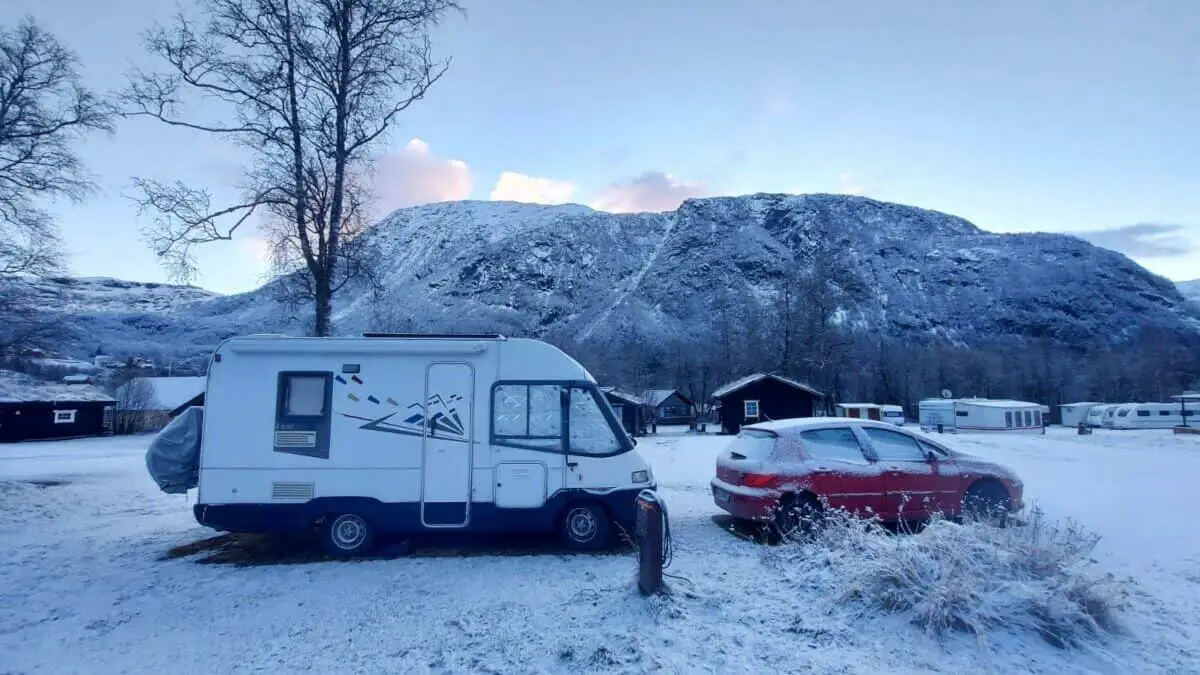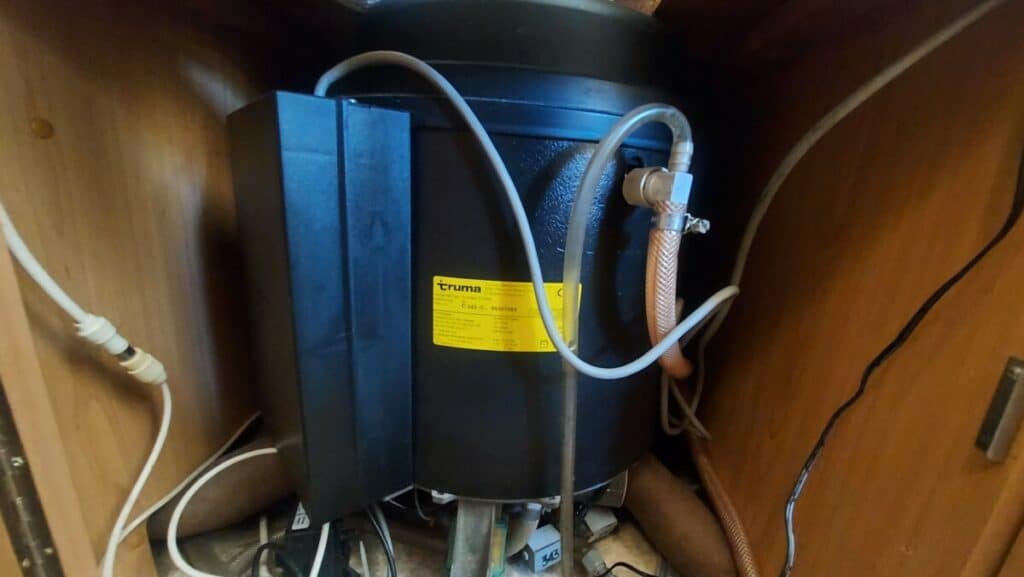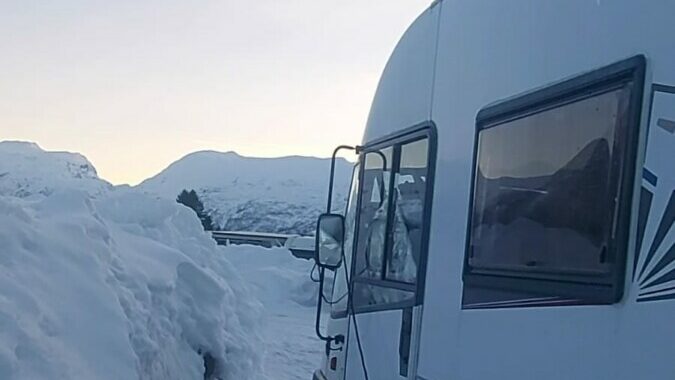This post contains affiliate links (I get a commission at no extra cost to you for purchases made through links in this post).

Are you worried about when your water heater will freeze during the winter? Even if you are using the motorhome, RV, or caravan for winter camping or having it parked without heat ready for the next trip.
Your motorhome, RV, or caravan water heater will freeze within 24 hours if the surrounding temperature of the water heater gets below 0 C (32 F). To ensure your water heater never freezes, drain it or increase the surrounding temperature, be warned when the temperature is too low by attaching a temperature monitor.
It is difficult to give precise requirements when the water heater freezes since it depends on a lot of different factors such as outside temperature, insulation of the motorhome, temperature around the water heater, insulation of the water heater, the water temperature in the water heater if it’s still warm since the last time you used it or not.
For those reasons i say, monitor the temperature in the immediate surrounding of the water heater and when it goes below freezing it will freeze within 24 hours unless you increase the surrounding temperature or turn on the water heater.
Will Motorhome (RV) Water Heater Freeze While Winter Camping?
If you are winter camping and the motorhome, RV, or caravan is heated; the water heater won’t freeze as long as its surrounding temperature doesn’t go below freezing. If it gets chilly outside, you can monitor the surrounding temperature of the water heater by installing a thermometer next to it.
Some are worried about accidentally having a frozen water heater while winter camping, but remember that the surrounding temperature of the water heater must get below freezing for it to freeze. So if you have the heater running and keeping a comfortable temperature inside the motorhome, you won’t need to worry in most cases. However, to be sure, monitor the temperature around your water heater.
If you monitor the surrounding temperature and notice it is getting close to freezing, you can either crank up your furnace/heater or start the water heater to make sure the water inside it is warm.
As an example, I have been spending a whole winter in Norway, it wasn’t that cold but down to -20C (-4 F), and I never had a problem with the water heater freezing, even at night when we turned down the temperature of the furnace/propane heater to 17 C (63 F) Instead, some water pipes were freezing.
If you want to read more about when the water pipes will freeze and when and why they froze for me in my non-insulated motorhome from 1996, I recommend you to read my other article if motorhome water pipes can freeze in one night.
To clarify, this was in a motorhome not made for winter camping; it has a low level of insulation, without double flooring, and is quite old, from 1996. However, it has a combined water heater/ furnace, so the water heater is built into the original heater, and since I was using the original heater to keep the motorhome warm, I never had to worry about the water inside it freezing unless I would leave it and the heater would malfunction and turn off.

Whatever type of water heater you have, if it is a combined heater/water heater or a stand-alone water heater, it should be placed in a well-isolated place, most times near the motorhomes furnace/heater, and because of this, it won’t be the first thing that will freeze up for you. The water pipes are usually much more sensible for freezing since they are thinner and go over a long distance, and often pass poorly insulated areas.
When your water pipes start freezing up for you, it is time to be extra careful and watch the temperatures around your whole water system.
Be aware if you are using a stand-alone heater/furnance and not the original heater
Be aware if you are using a stand-alone heater/furnace and not the original heater, there might be a higher risk of frozen water heater and water pipes since the original heater/furnace has a fan that circulates the warm air via lines all over the motorhome to spread the warm air evenly into cabinets and along water pipes and the water heater but a stand-alone electric element that you just put on the floor won’t do that.
Since there are a lot of factors that vary greatly depending on the insulation in different models and brands, where the water heater is placed inside the motorhome, what heater you are running, and what inside temperature you are keeping. The best way of monitoring if the water heater will freeze is to monitor the immediate surrounding temperature of it and keep it above freezing.
Some water heaters also have an emergency emptying system that automatically empties the water heater when it reaches a specific temperature.
Will My Motorhome (RV) Water Heater Freeze When Not in Use?

If your motorhome, RV, or caravan is parked without heat and not in use, your water heater will freeze within 24 hours when the inside temperature near the water heater goes below 0 C (32 F).
Suppose you don’t use the motorhome, RV, or caravan and expect temperatures below freezing. In that case, I recommend heating or draining all water and winterizing it to avoid damage to the water system.
Without any source of heat inside, it can go quickly; what if the weather forecast says 0 C or 32 F only for 2 hours at night, but it ends up being a couple of degrees colder the whole day? It could become a costly mistake if you are not monitoring the temperature next to the water heater, winterizing it, or turning on the heat so that I wouldn’t take the chance.
Conclusions:
If you are winter camping and keeping a warm and pleasant temperature inside your motorhome, RV, or caravan at all times, use the original heater, which allows for good circulation of the warm air and keeping an eye out for the temperature around the water heater you don’t need to worry about it freezing.
Suppose you are not using any heat source inside the motorhome, RV, or caravan and the inside temperature near the water heater goes below freezing. In that case, you will have a frozen and possibly destroyed water heater within 24 hours.
To know exactly when your water heater will freeze you must monitor the temperature around it since there are too many factors to count on otherwise.
